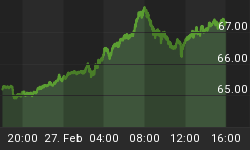Traders should start to watch the currency markets which have central bank meetings this week. These include the Canadian Dollar, Euro and the British Pound. All have reports scheduled for June 4th. Since each market is at an extreme level and by some measures overbought, traders should begin to watch for clues for a top or the start of a trend reversal.
The Bank of Canada is expected to keep its benchmark interest rate at .25%. In addition it is expected to reiterate its stance that the rate will stay at the current level until the second quarter of 2010. Most traders are curious as to how much if any quantitative easing the BoC will apply. At its last meeting, it approved the use of quantitative easing but refused to use it, instead seeking to take a "wait and see" attitude toward the economy.
Although the Canadian export market is improving because of higher industrial metal and crude oil prices, some traders are concerned that the price of the Canadian Dollar may be getting too high. Some feel that a high priced currency will curtail demand for Canadian exports. This topic will most likely be addressed by the BoC at the meeting. The June Canadian Dollar is likely to react off this news especially if it involves setting an upside price limit for the Canadian Dollar.
The European Central Bank will meet on June 4th. Last week traders expressed concerns based on a comment from an ECB official that the benchmark interest rate may break the 1% barrier. This comment caused a one-day reaction to the downside which has since been absorbed by traders. The key factor which would lead to another cut in interest rates will be the economy. The Euro Zone is showing some improvement in sentiment but real numbers are still showing a weakening economy.
Although the ECB is likely to keep interest rates at 1% based on pre-report trading action, they may make an announcement regarding additional quantitative easing. This will most likely come in the form of more purchases of government assets. The market will react depending on the size of the quantitative easing if any.
Two other concerns which may be addressed deal with the toxic debt that is still present in Euro Zone banks as well as Eastern and Central European banks. Some traders feel that this toxic debt is a time bomb which may ignite at anytime should credit market problems or another financial crisis quickly surface.
Other traders are expressing concern about the rapid rise in the Euro. These traders feel that the ECB is going to have to address the matter of the effects of a higher priced Euro on the export market. Like the Bank of Canada, the European Central Bank may propose limits on the Euro or propose a means of weakening the price of the Euro.
The rapid rise in the British Pound is raising eyebrows but not concerns. The dominant uptrend has been surprising traders because just a few weeks ago, the Bank of England was getting attacked for its actions which have created a huge budget deficit. In addition, the BoE was being criticized for applying too much quantitative easing and for not being aggressive enough. Nonetheless the market may have been ahead of the news as yesterday both manufacturing and housing posted better than expected numbers.
The BoE is expected to leave interest rates unchanged and is likely to comment on the deficit and may even introduce an exit strategy for its plan to buy government assets. Calling an end to its plans to apply quantitative easing could move the markets as some camps will see it as a bullish sign that the economy is on its way to recovery. The bears however will see it as a poor choice which could send the economy into a tailspin once again.
Today is June 2nd; traders have two days to watch the markets to decide if they are offering any clues as to how these central banks will react to the possibility of an upturn in the global economy.















